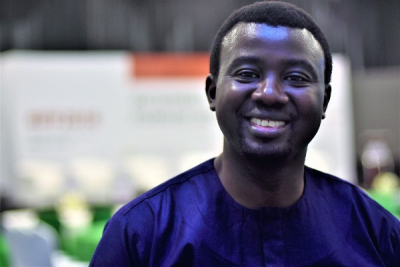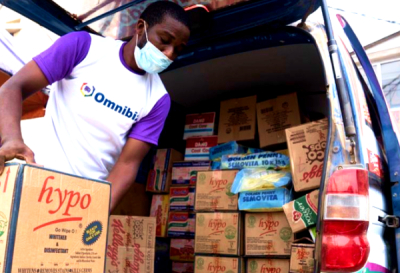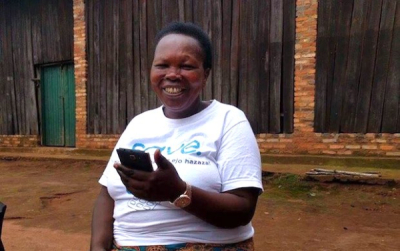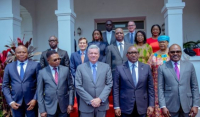In 2014, she decided to relocate to Morocco and contribute to the development of her native country. The choice has proven judicious since the healthtech solution she introduced won her national and international awards.
Zineb Drissi Kaitouni (photo) is a Moroccan entrepreneur and trained financial analyst. In 2014, she co-founded healthtech DabaDoc with Driss Drissi Kaitouni to facilitate access to healthcare and improve the management of medical appointments. Her startup has close to eight million users in several African countries. They use DabaDoc platforms to set appointments with over 10,000 health professionals specialized in more than 100 medical specialties.
DabaDoc was “initially developed to help health professionals manage their agenda and digitize patient pathways. It now helps digitalize patients’ records and offers a reliable and secure video consultation platform to doctors who have adopted this cutting-edge tool,” Zineb told Moroccan media La Nouvelle Tribune in March 2022.
The tech entrepreneur started her professional career, in 2003, as an analyst for Goldman Sachs. In 2012, she co-founded Ruby’s in London, before relocating to Morocco, in 2014, to contribute to the development of her native country.
She chose the health sector when she found out how challenging it was for the population to access healthcare because of factors like unavailable assistants, and poor appointment management leading to crowded offices. She decided to address those challenges with technology.
Her choice proved to be a good bet because, thanks to DabaDoc, Zineb has received several national and international awards. She for instance won the first prize in the Global Innovation for Science and Technology in 2014. She also won third prize in the SeedStars World competition the same year.
In 2015, Aspen-Blackstone selected DabaDoc as one of the top 10 startups in the MENA (the Middle East and North Africa) region. Four years later, Zineb was nominated as a Technology Pioneer by the World Economic Forum and even won the Endeavor Entrepreneur award.
In April 2021, Orange Middle East and Africa entered DabaDoc’s capital. The operator also introduced its payment services to make DabaDoc’s services more accessible and add new services. Thanks to that partnership, the startup launched its services in Côte d’Ivoire, in June 2022.
Melchior Koba
The coronavirus pandemic triggered a surge in remote work. Companies are now more open to hiring remote talents. Talenteum wants to facilitate the process by allowing access to a remote African talent pool.
Talenteum is a digital solution developed by Mauritian organizational development firm Talenteum Group. The solution allows companies to hire their workforce from a remote African talent pool. It also allows African professionals to join its talent pool to seek employment.
The platform boasts an active community of African professionals, from accountants to project managers. By subscribing to its monthly or yearly membership, companies can access that pool and launch recruitments. To launch those processes, companies have to fill out dedicated forms giving relevant details on the skills desired. Once those steps are completed, Talenteum takes over by posting relevant job ads, gathering resumes, and carrying out initial interviews.
In 2019, Talenteum made it to MyAfricanStartup.com's annual list of the 100 African startups worthy of investment. The following year, it was one of the finalists of the World Summit for Migration and Development, enabling its founders to present the solution during the Migration Challenge led by the International Organisation of Employers (IOE) and Seedstars.
Adoni Conrad Quenum
The appointment is the culmination of an extensive experience in the digital sector and several fellowships.
On August 16, 2022, Nigerian social entrepreneur Gbenga Sesan (photo) was selected among the ten members of the inaugural leadership panel to steer the Internet Governance Forum (IGF) up to 2023.
Reacting to his selection among the inaugural team, Gbenga “welcomed the appointment saying he was honored and looking forward to serving the world alongside the high-level leaders and also influence digital policy globally,” informs a release by Paradigm Initiative - which the Nigerian entrepreneur serves as an executive director.
The Nigerian social entrepreneur was selected following “an open call for nominations,” we learn. This experience will add to the skills he acquired working, between 2008 and 2012, as a member of the UN Committee of e-Leaders for ICT and Youth. During his time as a member of that committee, he “Worked with selected young experts from various regions of the world to discuss youth input in the global ICT space” while still assuming his normal duties as the executive director of Paradigm Initiative.
In Nigeria, Gbenga served as a member of two presidential committees. They are namely the Presidential committees on Harmonization of Information Technology, Telecommunications and Broadcasting Sectors (2006) and Roadmap for the Achievement of Accelerated Universal Broadband Infrastructure and Services Provision (2013).
From 2020 to 2021, he has been a non-resident scholar at Standford University’s Digital Civil Society Lab. He also received several fellowships including the Cyber Stewards Fellow, Crans Montana Forum Fellow, and Archbishop Desmond Tutu Leadership Fellow.
All those fellowships and nominations are the culmination of an extensive experience in the IT sector. He started his professional journey in 2001 with the Nigerian branch of Junior Achievement Worldwide, a global network dedicated to empowering students in financial literacy, work readiness, entrepreneurship, and digital literacy. During his time with Junior Achievement Nigeria, he led the Lagos Digital Village, a joint project with several partners including Microsoft and the Lagos Business School. In the early days of the coronavirus pandemic, he advised the World Health Organization on data privacy. He is currently advising the World Economic Forum on its Trust Operationalization Project to develop a rights-based data policy for businesses.
Melchior Koba
The funds will help build customer loyalty and boost retention. It will also help launch regional expansion.
Nigerian B2B platform Omnibiz announced, Friday (August 19), it completed its pre-series A round, raising US$15 million. The platform will use those funds to accelerate its growth, win customer loyalty and retention for more revenue.
The round, led by Timon Capital, had Ventures Platform, LoftyInc Capital Management, Chapel Hill Denham, Chandaria Capital, and Musha Ventures as participating investors. It consisted of US$5 million as equity participation and US$10 million as debt investment.
“We believe the smart informal retailer – not shopping malls - is the future of modern retail in Africa. By providing the capital, tools and logistics, we will enable retailers to offer great merchandising at an affordable price point to win their customers’ trust. This funding will allow us to quadruple the profitability of our retailers, build a scalable and profitable business, and take us one step closer to transforming African retail,” said Omnibiz co-founder and CEO, Deepankar Rustagi.
According to Techcrunch, Omnibiz will use the funding to double down on winning the loyalty of its retail customers and drive client retention.
Meanwhile, Disrupt Africa explains that by “employing its holistic strategy to become the primary B2B operating system for retailers – helping with last mile delivery, procurement, working capital, inventory management and operational tools for tracking sales, cost, prices and profit – Omnibiz projects a 4x revenue increase for its retailers.”
The company will begin its regional expansion this month, we learn.
Omnibiz was founded in June 2019. It allows retailers to place orders and have those orders delivered to their doorsteps free of charge. Retailers can place their orders via the company’s mobile apps, by chatting on Whatsapp or by calling a dedicated support number.
To date, the e-commerce platform connects retailers in Nigeria and Ghana to more than 200 brands while the goods are delivered by its network of over 70 logistics partners. More than 3,000 retailers use its platform daily, Omnibiz claims. With the information provided by the platform, retaillers can view inventory in real-time and avoid buying products that may prove difficult to resell.
For Nikos Katsaounis, Timpon Capital Partner, the Fast-moving consumer goods “ supply chain is fragmented, inefficient, and opaque. Omnibiz tackles all of these problems and addresses them with an efficient software layer that provides much-needed data on this otherwise obscure market and supply chain.”
Samira Njoya
During his presidential term, which started in April 2013, the outgoing president Uhuru Kenyatta, initiated a set of projects transforming Kenya into a tech powerhouse. His successor plans to build on his achievements to make the country a digital transformation reference.
On August 15, William Ruto was declared the winner of the last presidential election in Kenya, one of Africa’s leading tech powerhouses. In his manifesto, the incoming president promised to implement projects aimed at accelerating the digital transformation initiated by outgoing president Uhuru Kenyatta.
One of his plans is to add 100,000 kilometers of optic fiber cable to the existing 9,000 km network in the next five years. The aim is to achieve universal broadband availability during the period. He also wants to increase the rate of public services digitization and automated critical government processes to 80 percent.
According to the manifesto, broadband and digital transformation will “play a critical role in enabling [Kenya] to make tremendous achievement in the other four pillars of Health, Agriculture, MSME and Financing as well in enhancing revenue collection via automation of VAT systems.”
In recognition of the digital sector’s impact on job creation and poverty alleviation, William Ruto also announced his plan to reduce internet costs to facilitate access to internet for Kenyan youth, therefore giving them the possibility to learn, get crucial information and do business.
He also promised to establish an “Africa Regional Hub” and promote “the development of software for export.” Similarly, the incoming president plans to develop the business process outsourcing (BPO) industry into a major export and job creation sector.
“The administration will strengthen Konza Technopolis to bring together industry, academic institutions and other innovators to co-invest in emerging technologies to create high-quality jobs that leverage on artificial intelligence, robotics and other technologies and thus enhance our regional and global competitiveness,” the manifesto reads.
The projects are aimed at making Kenya a digital transformation reference on the African continent by 2027 and guaranteeing effective human, economic and social development. The investments required to carry out those projects are estimated at Ksh40 billion (US$334 million), to be financed by the Universal Service Fund. The fund, managed by the Communications Authority (CA), is made up of taxes levied on licensees, government appropriations, grants, and donations.
Muriel Edjo
In Africa, rural areas are usually shunned by banks. Therefore, residents of those areas have to rely on alternative solutions. With Save, Rwandan startup Exuus wants to make those alternative solutions more efficient.
Save is a fintech solution developed by Rwandan startup Exuus. It allows individuals to “save collectively” for financial empowerment.
The solution was developed to facilitate an already existing process. “The lack of financial access for poor and vulnerable populations limits their access to a range of services and opportunities and, therefore, exacerbates their vulnerability to, in turn, end up in cycles of poverty. [...] To break this cycle, for decades now, low-income people both in urban and rural areas create savings groups. The savings circulates among members through different ways and return to members in credit or savings with interest giving them access to affordable capital to grow their small businesses and become financially resilient,” explained Exuus founder, Steve Shema.
Save makes the collective savings and loaning process smoother and more efficient. Thanks to its mobile app (available for Android and iOS devices), web platform, and USSD code, the solution empowers members of each saving group. After paying dues, members can apply for loans to start or expand their businesses.
The solution also helps members who belong to many saving groups to monitor their savings and pay their contributions without paying any transaction fee. In 2019, Exuus revealed that based on the feedback received for its fintech solution, it was planning to establish a presence in other East African countries. However, it said it was “tapping into a market of US$64 million in Rwanda and more than US$2 billion in annualized savings in East Africa.” At the time, the startup had already raised some US$575,000 for its operations.
Adoni Conrad Quenum
Despite the ongoing crises and long-standing structural issues, the African startup ecosystem is still thriving. However, it is not yet up to par with the ecosystems in other continents, Europe, and North America namely. The initiative is aimed at helping reach its full potential.
UNDP Africa launched, Wednesday (August 17), timXLAGOS, the Nigerian chapter of Timbuktoo, an initiative aimed at investing US$1 billion of private and public funds to “spur the startup revolution across Africa.”
According to a UNDP release, the aim of Timbuktoo is to “get a lot of private and public sector partners to help set up eight Timbuktoo Hubs in places that are known to have strong startup ecosystems, such as Accra, Nairobi, Cape Town, Lagos, Dakar, Kigali, Casablanca, and Cairo.”
Timbuktoo was initiated in 2021, to contribute to UNDP Africa’s mission to transform the continent by leveraging its population, “especially its ambitious and dynamic youth.” Through the US$1 billion initiative, UNDP plans to help some 1,000 African startups grow significantly over the coming decade.
“The Timbuktoo approach will be based on finding, nurturing, and building African solutions put forward by Africa's youth that directly address one or more of the 17 Sustainable Development Goals (SDGs),” UNDP Africa indicates.
To achieve that goal, the initiative will facilitate the construction of eight private-sector-driven Timbuktoo hubs across Africa. Each of them will focus on a key area -fintech, agritech, Healthtech, Greentech, Creatives, Tradetech and Logistics, Smart Cities and Mobility, or Tourismtech- and host a venture builder and a venture fund.
According to the UNDP release, “Timbuktoo has made significant progress since its inception.” It launched the development of University Innovation Pods (UniPods) in ten “lower-income countries” namely Benin, Chad, Guinea Conakry, Lesotho, Malawi, Mali, Rwanda, Sierra Leone, South Sudan, Togo, and Uganda. The universities will encourage innovation and design thinking. That way, they will prompt the development of strong startup ecosystems in those countries, making them worthy to host Timbuktoo hubs. They are expected to become operational by end-2022, we learn.
For Eleni Gabre-Madhin, UNDP Africa Chief Innovation Officer, “Timbuktoo is a big, innovative, and unique initiative to overcome the present vacuum in early-stage risk capital, to better integrate African innovation stakeholders from universities to corporates to investors, and to enable startups to embrace the African market opportunity.”
Samira Njoya
In recent years, Tunisia has placed a particular emphasis on digitization. The aim is to streamline administrative procedures and facilitate access to digital services by 2025.
In Tunisia, citizens can now order and receive birth certificates online. On August 16, 2022, a joint decree from the Ministries of Interior, Justice, and ICT consecrated the effective launch of the project, which was announced months earlier.
According to the decree, the birth certificate will now be issued online, in compliance with the applicable laws governing the protection of sensitive documents. “The document is issued online through the civil registry’s online platform,” the decree indicates. It adds that the document will be issued for free during a 6-month pilot phase, through the digital platform www.e-bawaba.tn.
The new project ends the cumbersome administrative procedures citizens had to complete to obtain their birth certificates. Also, with a fully digitized issuance system, the processing time will be reduced.
This is the second digital reform being implemented in Tunisia in about two months. On July 1, the country launched Mobile ID, a mobile identity project aimed at linking phone numbers to ID cards and generating personal QR codes for citizens.
The two projects are part of the national strategy to facilitate citizens' access to public services and reduce processing times.
Samira Njoya
The bureau is part of the US fintech company’s African expansion strategy. It will serve as a base for the extension of Visa Inc.’s footprint in Central Africa.
Electronic payment solutions provider Visa Inc. recently opened a bureau in the Democratic Republic of Congo (DRC), its first in Central Africa. The bureau was inaugurated during an official visit of a Visa Inc. delegation led by its CEO, Alfred Kelly.
On Wednesday, August 10, in Kinshasa, the delegation met with Congolese Prime Minister Jean-Michel Sama Lukonde to discuss digitalization projects. During the audience, Alfred Kelly explained that the DRC bureau is urgently needed because the country is one of the most dynamic in Africa. Visa is “pleased to establish a local presence (there). Our shared goal is to expand access to e-commerce and support the DRC economy by working closely with public and private partners,” he said.
Through its local bureau, Visa will partner with public and private actors and decentralize access to digital services for the population by introducing new solutions. It will also create solutions facilitating payment collection.
During one of his previous visits to the DRC, Alfred Kelly inked partnerships with the country's central bank, financial institutions, fintech companies, merchants, and mobile operators. In the coming months, Visa will issue unique identifiers for more than 150,000 M-PESA clients in the DRC. It will also assist fintech company Infoset in a project to boost financial inclusion.
The DRC bureau is the eighth inaugurated by Visa Inc. in Africa. The seven others are in South Africa, Côte d'Ivoire, Morocco, Rwanda, Kenya, and Nigeria. In 2016, when it inaugurated its bureau in Côte d'Ivoire, Visa justified it with its ambition to capitalize on the growth potential of the French-speaking African market and also get closer to its clients, who are involved in the development of digital payment solutions.
Samira Njoya
Corporate environmental responsibility has become a global trend in recent years. In its framework, businesses take actions to reduce their negative impacts on the environment. Taaply wants to assist in that process by introducing smart cards.
Taaply is a digital app developed by Cameroonian startup Taaply Inc. It helps read the contact information embedded in the QR codes of the smart cards issued by the Cameroonian startup.
By launching its smart cards, Taaply Inc (founded in 2020) aims to offer green solutions that will end paper use in the business information-sharing process. “Africa has a high rate of carbon emissions, with few methods on reducing its carbon footprint [...]. I believe Africa will benefit tremendously from digitizing business cards, thus reducing their carbon footprint and helping the environment,” says Taaply Inc. cofounder Lekel Asonganyi
Its business card reader is available for Android and iOS devices. It allows paying customers to update their business and personal information.
Taaply Inc. offers three types of cards. The first is the “Social Card”, which costs US$29.95. It is for “social enthusiasts such as students, bloggers, and non-business owners.” The second type of card is the “Pro Card (which costs US$39.95), dedicated to “ small business owners and entrepreneurs.” The last one is the “Corp Card” (US$64.95), which is the “perfect” solution for enterprises. It can be customized with “company logo, color, design and more.”
In 2021, Taaply Inc revealed that it had over 400 paying customers, with plans to expand into other African countries, namely Chad, Togo, Nigeria, and Kenya.
Adoni Conrad Quenum
More...
The round is announced just months after the last fundraising operation concluded by the fintech company. Its proceeds will help the company expand further and develop new products and services.
Ghanaian fintech startup Zeepay announced, Friday (August 5), the completion of a Series A round, raising US$10 million. The funds were raised from Netherlands-based Symbiotics BV (US$9 million), with participation from a Mauritius-based fund (US$1 million). They will enable the startup to expand into selected African markets and boost its offers.
In its release announcing the round, Zeepay quoted its founder and managing director Andrew Takyi-Appiah, saying that the “raise was necessary and comes at the time when we are planning to increase our annual turnover from USD 1.5 billion circa 2021 to USD 200 billion over the next 5 years.”
Zeepay was founded in 2016. It provides digital solutions to facilitate online transactions. Currently, it claims over 130,000 transactions facilitated monthly. In March 2020, it became the first Ghanaian company to receive an Electronic Money Issuer (EMI) license from the central bank BoG. The startup is already operational in 20 African countries. But, it wants to increase its continental footprint and “augment support from local African Banks the likes of Ecobank, Fidelity Bank and Absa” as its CFO Godfried Boakye puts it.
Samira Njoya
Absenteeism is one of the main problems affecting education in Africa. To address the problem, DRC is betting on technologies.
Last Thursday, Tony Mwaba Kazadi (photo, left), DR Congo’s Minister of Primary, Secondary, and Technical Education, inaugurated a digital attendance tracking system in Gombe. The system will allow the government to check the daily attendance of teachers under the Ministry of Primary, Secondary, and Technical Education.
According to Minister Mwaba Kazadi, the attendance system is “part of a positive sanction scheme that comes after punitive sanctions, which are still necessary to rehabilitate the education sector that once lacked strong leadership and exemplary governance.”
“You are now invited to use this tech system [...] which helps the Ministry [of Primary and Secondary Education] end absenteeism. It will provide credible data on the active workforce for an improved school administration. The human resource management department will also have to send us credible attendance rates to help us improve work performance,” he added.
Henceforth, teachers and administrative staff will use their biometric cards to certify their presence in classrooms and offices. The system is implemented to fight problems like absenteeism and duplicate records (by ghost workers) that affect the country’s education sector. It will also modernize the administration by capitalizing on modern technologies.
It is initiated to stabilize the formerly unstable public administration. With that digital attendance system, the country hopes to significantly reduce teachers’ absenteeism rate which is one of the reasons students’ achievements have dropped in recent years.
Samira Njoya
In the short term, the digitalization of the cadastre will improve land management and reduce conflicts.
DR Congo recently took a step further towards the digital transformation of its public service. On August 2, 2022, Minister of Land Affairs Aimé Molendo Sakombi (photo, left) signed an agreement with Luxembourg company eProseed for the implementation of e-Foncier, the country’s digital land management platform.
According to Minister Molendo Sakombi, the contract makes eProseed the government’s partner in the implementation of that project. It ends a “long quest for a reliable partner that will lead the digitalization of the cadastre and secure land/property titles,” he added.
The government official explained that the digitalization of the cadastre is required for the department of land affairs to meet expectations, fueled by the country’s large land potential. It will also help maximize revenues, reduce land conflicts and safeguard social peace, he informed.
The e-Foncier project will enable the government to make land management more transparent and secure more revenues. It will also make investors and individuals feel secure when it comes to land affairs. In addition, it will allow public authorities to access secure land data right from one single database and create more jobs.
The agreement with eProseed includes the construction of a "Land Tower", which will house the whole Ministry of Land Affairs, the General Secretariat, and the future National Center for the digitization of the cadastre, as of 2024. The company will also create an e-Foncier platform with a data storage feature based on artificial intelligence and blockchain. The platform will be the key tool for modern land management in DR Congo, we learn.
To fund the project, eProseed will contribute US$140 million without government support or sovereign guarantee. It will also disburse an additional US$15 million for the construction of the tower.
The e-Foncier project is part of ‘Horizon 2025’, the country’s digital plan that aims to resolve land conflict by securing land/property titles. For Minister Moelndo Sakombi, the implementation of this large project will usher in a new era, which will be utterly different from what is being witnessed currently.
Samira Njoya
Data is a key asset in the transformation of Africa’s agriculture sector. Therefore, by unveiling that platform, Senegalese authorities want to ensure the availability of reliable data for the elaboration of effective agricultural policies.
On Friday (July 29), Senegal unveiled AgriData, its national agriculture analytics platform. The platform was launched, in Dakar, by the National Agency of Statistics and Demography (ANSD), the Directorate of Agricultural Analysis, Forecasting and Statistics (Dapsa), and the Agricultural and Rural Prospects Initiative (Ipar). During the launching ceremony, AgriData awards were conferred to young journalists and researchers for their contribution to the development of sustainable agriculture in the country.
According to Cheikh Oumar Bâ, Executive Director of Ipar, the platform is a requirement to enable access to streamlined and efficient agriculture data for citizens. He explained that to ensure the reliability of the “reference platform,” data producers and users were rallied.
The new platform shares comprehensive, reliable, and timely agricultural statistics and data that can inform evidence-based agricultural development policies. Its aim is to allow easy and quick access to agriculture information produced by actors and stakeholders right from a single platform.
AgriData will also present the agriculture projects implemented by Senegal and their status reports. “The platform will present sectoral surveys conducted by national and international organizations,” Cheikh Oumar Bâ added.
Thanks to AgriData, which is part of Senegal’s strategy to meet the food security and sustainable agriculture goal by 2030, the country wants to pioneer agriculture data exploitation in Africa.
Samira Njoya















